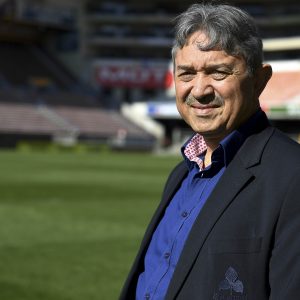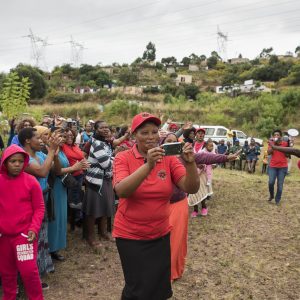Siya Kolisi is looking for rugby redemption
The Springbok captain has made headlines for his philanthropy, activism and being rugby’s most marketable player. But his game has fallen behind, something he hopes to address at the Sharks.
Author:
27 March 2021

Siya Kolisi’s first day as a Sharks player coincided with the franchise’s induction of its latest academy intake. All the new recruits gathered at the four-sided monument just inside the King’s Park Stadium entrance with a rock bearing a private inscription of what’s important to them for the rock-laying ceremony to make up isivivane.
The point of turning up at the cairn, the four sides of which represent the cardinal directions from whence all the players came, is to add their rock – and by extension the essence of what they bring as Sharks players – to the pile as a symbol of their contribution to the collective.
Simplistically put, this pile of wishes, as someone once elegantly described isivivane, is a pledge of one’s service and, in a sense, dreams to the greater good of the Sharks’ growing young culture.
Given the mild upheaval leading up to him joining the Sharks – the wrangling over compensation for his early release from the Stormers, the persistent talk of the move being a negotiated settlement by his new franchise and its equity partner, MVM Holdings, and his form falling off a cliff since the Rugby World Cup – there was the temptation to ask Kolisi what he had written on his rock.
Related article:
With his private life all but an open book these days, maybe we should normalise allowing the man we’ve grown to think of as public property to keep the odd personal thought to himself. Yet it’s tough not to be curious about what this new chapter means to Kolisi.
When HarperCollins releases the official biography this year that Boris Starling is writing, the thread is likely to be one of wildest dreams coming true. Kolisi became the first Black Springbok captain in 2018 and 2019 brought World Cup victory. In 2020, he realised the launch of his foundation, and gained worldwide recognition and dizzying celebrity. He and his wife Rachel released their gender-based violence film We Are Dying Here this year, with his autobiography and a documentary still to come.
Simply put, the more outlandish Kolisi’s wishes, the more readily they have been granted.
Balancing rugby and superstardom
So what does a man with everything want from what is essentially just another stint at a rugby franchise? Having relinquished what some feel is the cause celebre of the captaincy, to play in the northern hemisphere? It’s difficult not to conclude that the 29-year-old is a man searching for something he hasn’t felt in a while: hunger.
Looking at the deal he struck with the Sharks, in which he committed to a two-month physical conditioning block that would allow him to finalise a lot of his off-field commitments in the first and focus entirely on rugby in the second, it would seem the franchise wasn’t sure if it was getting the rugby player or a face on an energy drink or one of his other endorsements.
Kolisi is adamant his hunger is intact, but it’s ironic that the reasons he feels he still has it are the very activities many feel get in the way of what Springbok coach Rassie Erasmus famously called “the main thing”.
Related article:
“When you speak about ubuntu, it means a lot to me because I was raised by the community I come from,” Kolisi explains. “I used to be helped by my neighbours with everything. And now that I’m where I am, I believe I’m not here just for myself, it’s also for all the people that played a part in the person that I am.
“So performing on the field for me is so important because it opened so many doors for me and us as a team [the Springboks]. [Winning] the World Cup opened so many doors that I gave myself to every single one of them.
“I can’t do everything, but I put that kind of pressure on myself to make sure that I’m there. That’s why I wanted to travel when Covid hit, because I wanted to make sure that the money the foundation was trusted with went to the people that needed it.”
Kolisi says he did take on too much at first: “People want to give you things you don’t need, but at the beginning I just went for it. I went to America for the first time, I went to Liverpool … it was all my childhood dreams happening at the same time.
“I don’t regret a single moment of it, although the travelling was tough. But when you have good people around you, they’ll tell you when to slow down or when to stop. I’m grateful to have that kind of team around me.
“Also, one of my best friends from back home in Zwide, who I took to the World Cup final with my dad, always keeps me in check by telling me when I get ahead of myself. You need people like that because you’re human, and sometimes you do think you’ve arrived.”
More to do off the field
That said, Kolisi says there’s still too much that needs doing for him to slow down completely.
“That’s what Covid helped me with … to never think what I’ve done is enough. What I realised is that it’s never enough. There are so many people who are in need and it scares me to think that after so many years of democracy there are still so many people suffering.
“I always thought that I struggled growing up, until I went to Limpopo and saw people who’d never had [running] water [in the house] before. That broke my spirit, and it made me realise that I can’t stop now, I can never be satisfied and I always have to keep on moving.”
Related article:
He says a combination of his wife and people at the Kolisi Foundation and his management company Roc Nation have taught him to be more discerning about what he takes on and align himself only with things that are close to his heart, but his packed schedule had already contributed to a dip in form.
“I’m a player that has to play five games in a row, especially at the beginning of the season,” he begins with the mitigating circumstances. “I didn’t get that because I got injured in the first game [against the Hurricanes]. I didn’t really do pre-season because we [the Springboks] were given time off because we were away for so long, so I had no [conditioning] base and I need that.
“I got injured in my first game, the season was stopped [because of the Covid-19 outbreak], I hurt myself in the first competition afterwards [Super Rugby Unlocked] and then Covid hit my family. So there was never consistency and that played a huge role.”
As a result, Kolisi is keen to play rugby free from the demands of who he’s supposed to be: “I love what I do, I love rugby. It’s opened so many doors for me and that’s why I knew I needed something new, a fresh start, to have that feeling where I don’t know if I’m going to make the team or not, to have to fight again and gain the respect of the people around me.
“So this move came at a perfect time for me. I am looking forward to getting the ball in my hands every now and again, playing rugby freely with no stress on my shoulders. A lot comes with the territory of being captain, there’s so much responsibility. I think now I’m going to play with a lot of freedom.”
Kolisi says when he woke up on the day of his announcement as a Sharks player, he felt “happy” as a rugby player for the first time in a while. “I can be a normal player, come in, train, do what I need to do, go home and spend time with my family… things I’ve never been able to do.”
A father first
Alone time has been very much a fleeting concept for Kolisi. “I don’t get a lot of it, but now I will because my family’s only coming to join me in Durban later in the year … But also, I don’t want to get comfortable with not having my family around because I still need to make sure that I’m a dad. When they come, it can’t be a huge adjustment for me. So, I’m going to find a way.”
As the child of teenage parents who was raised by his grandmother, being a dad is paramount to him. And he’s “fighting” for a relationship with his own father, Fezakele Kolisi. “My dad and I are good but we still have our difficulties, like everybody else,” he says. “My big thing is, as you can see, I’m standing up against gender-based violence and for gender equality, and I believe it doesn’t only start with the abuse.
Related article:
“There are so many other things and there are a lot of fatherless homes in our country. My dad is alive and we had a conversation where I asked him a lot about my youth and the way he was raised, because it may have had an impact in how he sees parenting.
“He and I have discovered that our parenting is different and we never had those conversations because as a Xhosa man you don’t do that. He doesn’t tell me that he loves me and I wanted that space and I want to make sure that men get to do that.
“I didn’t do it publicly because I wanted approval, I wanted to let other men know that it’s okay. This whole thing about being macho … we need to show vulnerability. I cry in front of my kids, I tell them I love them and I kiss them on the lips because it’s okay. I want to show them everything I didn’t get to see and I want my dad to be part of that journey.”
With everything he’s ever wished for having been granted tenfold, Kolisi has his hands full dreaming even bigger.
“When you’ve achieved all of this, it’s tough to sit and think, ‘Okay, what’s next? What do I do?’ I always think that what happens on the field allows me to be able to do that because if I start playing badly, I become irrelevant.”
It’s not often that someone who, for want of a better word, is trending goes looking for redemption. But that’s exactly what Kolisi is doing.




